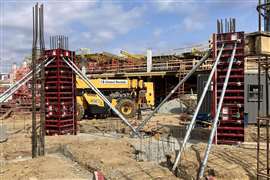UK government plans strategy
01 June 2011
The UK government is claiming that costs will be reduced by up to 20% with its new Construction Strategy that reforms the way it procures construction across all sectors.
At the same time, the number of UK businesses going bankrupt in the construction sector has jumped by 19%.
The government claimed that the cost reductions would take effect by the end of the current parliament, which will run for four more years at most.
The strategy was welcomed by RICS (the Royal Institution of Chartered Surveyors). Chief economist Simon Rubinsohn said, "The new Construction Strategy represents an excellent opportunity for the government and the industry to work together to ensure value for money across public construction and infrastructure projects."
The government said its Plan for Growth - published alongside the 2011 Budget and the Infrastructure Cost Review Implementation Plan published earlier this year -highlighted the "critical importance" of an efficient construction industry to the UK economy and "the need for reform of public sector construction procurement to improve value for money to taxpayers, and enable the construction industry to focus on bringing forward innovative solutions".
The strategy sets out the detailed programme of measures that government will take to reform the way in which it procures construction.
Francis Maude, Minister for the Cabinet Office, said, "These savings are not only significant but long overdue.
"The commitment to reduce the cost of construction by 20% is no small thing, but it will help the government and the construction industry. This strategy will stimulate growth by enabling more to be constructed within the funds available."
He said the construction industry would benefit from a more collaborative working relationship with the public sector, "allowing for innovation, increased efficiency and delivering better value for money".
A new Government Construction Board is being set up, which the government said would provide effective co-ordination and alignment of procurement across the government's construction and infrastructure programme.
The new board will be chaired by Paul Morrell, the government's chief construction adviser, who said, "The Government Construction Board will help strengthen the public sector's client power in the scoping, design, procurement and delivery of all construction projects.
"We will work with the government and the construction industry to enable more effective relationships between the two in order to enable growth and sustainability across the sectors."
Mr Rubinsohn said, "Taking into account new developments such as Building Information Modelling (BIM) will help this process along with the move to a more collaborative approach to relationships between the public and private sector.
"The rolling two-year forward programme of projects will demonstrate the government's ongoing commitment to this process and will provide the certainty needed by the industry to take long-term business planning and investment decisions."
He added, "Recognising the public procurement system needs reform is the first step and it is now up to all those involved in the process to ensure value for money for taxpayers, efficient delivery of projects and a system that encourages effective collaboration."
Dr Neil Bentley, deputy director general of the Confederation of British Industry (CBI), said: "The Construction Strategy identifies a number of key priorities that we have been calling for, including reducing unnecessary cost in public sector procurement and providing a pipeline for infrastructure projects.
"The strategy is a positive step forward, recognising the important role that construction plays in the UK in terms of jobs and economic growth."
A new report has found the number of UK businesses going bankrupt in the construction sector jumped by 19% to 948 in the first quarter of 2011 compared to the fourth quarter of 2010.
Accountancy firm Wilkins Kennedy, said it was the first quarterly rise in insolvencies in two years and that it had stoked fears of another prolonged downturn for the sector.
Anthony Cork, director at Wilkins Kennedy, said, "The government has slashed capital spending on infrastructure across the board in order to plug the deficit, and that has pushed the construction sector into a double dip.
"Fiscal stimulus at the start of the recession had included substantial infrastructure projects that keep the construction sector's head above water. But that support is now being withdrawn."
He added, "The question now is how quickly private sector construction work will be able to pick up the slack left by the public sector. So far this has not happened."
Wilkins Kennedy said that experts estimated that public sector spending on construction projects represented about 40% of the industry's turnover. It said the government was committed to halving this, with more than £ 90 billion (€ 102,9 billion) of capital spending cut between now and 2014.






